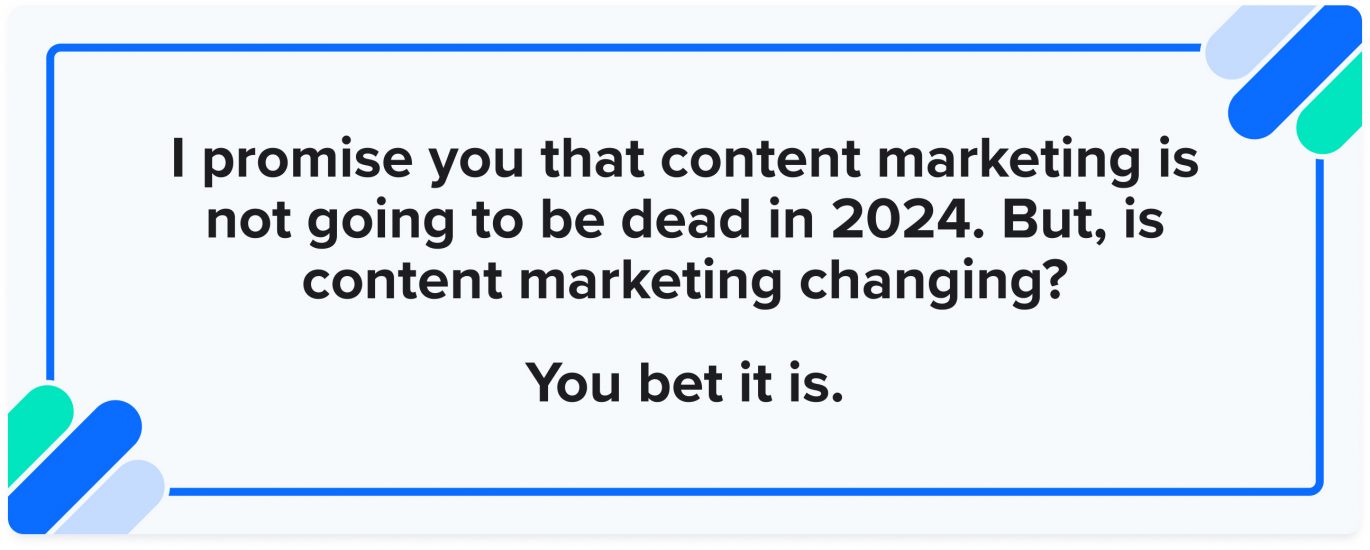I heard this question recently and, honestly, it made me chuckle: Is content marketing dead in 2024?
My answer, of course, is no, content marketing is not dead in 2024. The reason it made me laugh? People have predicted the deaths of all kinds of marketing for years. For decades. Email marketing is dead. Google ads are dead. Direct mail is dead.
You get the idea.
But I want you to think about this: Radio advertising, which seems like a total dinosaur to many of us, is poised to top $11.7 billion in spending in the U.S. in 2024 (up from about $10 billion in 2020).
The message here is that marketing tactics have a long history of not dying the way the experts say they will.
Content marketing is no exception, I promise you that content marketing is not going to be dead in 2024.
But, is content marketing changing? You bet it is. And if you’re approaching it the way you did in 2014, you’re going to be way behind. Below, I’ll explain what I think the new year holds.
The way we think about traffic has to change
If you ask the average marketer what the point of content is, they will generally say the same thing: It’s for traffic.
This is the traditional inbound funnel.
You make content that ranks for certain keywords.
This content attracts traffic.
You capture some of this traffic as leads
Some of these leads enter the sales process
Some of these opps turn into customers.
Traffic, leads, and sales. Traffic, leads, and sales.
The hope was always that if you put more traffic into the top of the funnel, more sales would come out at the bottom.
And in many cases, that has been true.
The problem with this approach is that it led marketers to produce fluffy content that brought in traffic — but not high-intent traffic.
This was fueled by a high focus on out-of-context numbers. (In other words, if traffic is the core marketing KPI, marketers will do what they need to do to boost traffic, even if it’s not going to influence revenue.)
And now, times are changing. It’s up to us to think differently. AI-powered content is flooding SERP pages, making it harder and harder to rank and get traffic. At the same time, generative search is taking market share away from traditional search engines, meaning the way people consume information is changing.
So, traffic won’t be as reliable as it once was — and it might not ever have been as reliable as people believed.
Content isn’t (just) about search
This changes the way we think about our content. If it’s not just about getting found in search, what’s the point?
First off, it’s important to remind ourselves that you will still get found in search. While we are seeing shifts, in many cases, search engines (and search engine users) still operate the way they have for years.
But I believe it’s time to think differently about what our content should be doing.
We must think of our content as educational, first and foremost.
This means that when people come to your website — whether through search, from social media, or because they heard someone tell them about it — your content is there to answer their questions and make it easy for them to buy from you.
Your content exists to answer their questions and alleviate their concerns. That’s job number one. Not traffic. Not clicks.
For some, this will feel like a radical departure. For others, they’ll think, yeah, that makes sense.
Be prepared to think broadly about what content should be
The second thing I see ahead for content marketing in 2024 is an ever-broader definition of what content means.
In the early days, “content” meant written content. That is, articles, pillar pages, ebooks whitepapers, and the like.
While those things are still important — but, be honest, when was the last time you downloaded and read an ebook? — the definition of content needs to keep expanding.
The first things on the list are obvious: video (long-form, short-form, and streaming), social media posts, events (digital and in-person), interactive content, and podcasts.
But that will be the tip of the future content iceberg.
As search changes, I expect social media to play an even bigger role in the way we discover products and services.
The companies that have a social media presence that’s authentic and approachable will be the ones to win. And they’ll be very creative in the ways they meet, engage with, and delight their audiences.
…and about how content gets consumed
At the same time, we can’t think of content as just a top-of-the-funnel tool. At IMPACT, we teach our clients that the MOST IMPORTANT application for content is in the sales process.
Sales enablement content that addresses buyers’ fears, worries, and concerns is content that’s going to streamline the sales process and actually bring revenue into your business.
When your marketing team and sales team work together on content, they provide a seamless sales experience — which is something that every business needs.
So, as we think about the future of content marketing, remember that the most impactful place for the marketing team to put their effort may be the very bottom of the funnel.
Content marketing in 2024 — and beyond
Content marketing is not dead, but the way you did it a decade ago is. If you’re hanging on to the same playbook, you’re in danger of losing relevance and limiting your future.
Tomorrow’s content marketing is AI-enhanced, full-funnel, buyer-focused, and, most importantly, creative and authentic.
If you’re not sure how to build a content marketing plan for your business’s future, talk to us at IMPACT. We help sales and marketing teams come together to build trust and capture revenue. Reach out to see what’s possible.


